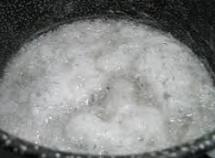In order to know the meaning of the term crystallization, we are going to proceed, first of all, to discover its etymological origin. In this case, we can state that it derives from Greek, exactly from the sum of two components:
-The noun “krystallos”, which is synonymous with “transparent glass”.
-The “-ization” component, which is used to indicate “action of converting into”.
Crystallization is the act and result of crystallizing . This verb refers to the fact of adopting the shape of the crystal and that which leads to acquiring precision or firmness. For example: “The police discovered a cocaine crystallization system two blocks from the Government House,” “We are going to continue working for the crystallization of our project,” “The doctor suggested that I carry out a study to analyze the crystallization of cocaine.” saliva.”
 A crystal can be a good quality glass, a body that has a naturally polyhedral shape or a solid with molecules and atoms that repeat regularly in space. Crystallization, in this framework, involves the adoption of a crystalline structure .
A crystal can be a good quality glass, a body that has a naturally polyhedral shape or a solid with molecules and atoms that repeat regularly in space. Crystallization, in this framework, involves the adoption of a crystalline structure .
Crystallization is usually used to separate a solid from a liquid into a homogeneous mixture formed by a solute dissolved in a solvent. The mixture is placed in a container known as a crystallizer and heated. The solvent, in this way, evaporates, while the solid precipitates due to the increase in the kinetic energy of its molecules . At the end of the process, when the temperature drops, the solid remains crystallized in the container while the liquid has already evaporated.
These characteristics mean that crystallization is used to purify solids and to obtain those products that are distributed as crystals, among which salt and sugar appear.
In addition to all the above, we cannot ignore the term crystallization speed. This is used to determine the speed at which a crystal grows and that depends on a wide variety of factors including both the surface, the solution and the resistance, for example.
In our daily lives we can find different examples of what crystallization is, such as these:
-The freezing of water. When water freezes and becomes ice, it does so through a process in which, in its first phases, different crystallized structures emerge.
-The formation of frost. When it is very cold and there is significant humidity, it can happen that the water vapor in the air crystallizes, forming what we know as frost. Thus, for example, it can be found in the windows of cars that have spent the night outdoors.
In addition to all of the above, we cannot ignore that there are two types of crystallization that are fundamental in the scientific field: crystallization by evaporation or so-called crystallization by cooling.
In a symbolic sense , crystallization implies that something becomes precise or concrete : “I need time for the crystallization of the idea,” “This program represents the crystallization of the will of different political groups.”
